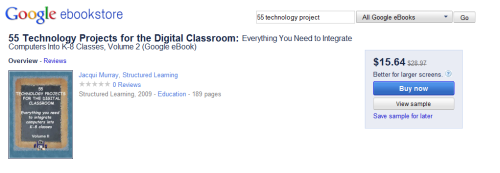Jacqui Murray's Blog, page 197
January 19, 2012
Book Review: Blowout
by Byron L. Dorgan and David Hagberg
My rating: 3 of 5 stars
Even if Amazon Vine hadn't sent Byron Dorgan and David Hagberg's Blowout (Forge 2011) to me to review, I would have read it because of Hagberg's name. His stories are always good reads with fast-paced plots, well-defined characters and enough surprises to keep me turning pages. With titles like Kill Zone, Assassin, and Twister, readers know their about to loose a couple of days of their lives to reading.
But I almost quit on him this time. To get to the good stuff, I had to endure lectures on global warming I've already read in too many newspapers and detailed science coming from the mouths of characters I wasn't sure I trusted. Global warming is politically-charged enough that just discussing it will make you love or hate the character. And Hagberg-Dorgan made that Shakespearean mistake (remember: Me thinks he doth protest too much) of trying to convince me for page after page (after page) that the country's energy policies were as screwed up as an earthworm in the wrong hole. If I agreed with him, he's preaching to the choir. If I disagreed, he's making me angry.
Finally–after eighty pages–Hagberg-Dorgan settled into the story line and I met the main character.
Eighty pages into the book? That's pretty late for a thriller. Hagberg has an entire column of publications to his name. He knows better.
But I digress. Finally, after eighty pages, the wild ride I'd been waiting for started. The plot revolves around America's insatiable appetite for energy. When American scientists get close to solving the problem with clean energy that doesn't rely on foreign oil, unexpected forces try to stop them. This is where small town lawman Nate Osborn (who is also a medically-retired Medal of Honor winner) and new journalist Ashley Borden become the unlikely pair who must stop the enemy. The characters are well-constructed and endearing, clearly created by the man who gave us super-hero Kirk McGarvey. The politics is disgusting (a good choice since something like 80% of Americans distrust politicians) and the stakes couldn't be higher. The problem is credibility. To believe the series of events postulated in this story could happen, I have to buy into the belief that a whole lot of people in power are more than self-serving, but downright evil, that we've reached a tipping point where the good people in power can no longer stand against the bad.
And that's why I gave this great writer only three stars. The politics is something I try to escape in thrillers so that lost one star. Then the bigger-than-life Medal of Honor hero was not enough to offset the incredulity of so many evil-minded people running our nation. That lost the second star. If I was grading solely on the power of the writing, Blowout would get a five.
Jacqui Murray is the editor of a technology curriculum for K-fifth grade and creator of two technology training books for middle school. She is the author of Building a Midshipman, the story of her daughter's journey from high school to United States Naval Academy midshipman. She is webmaster for five blogs, an Amazon Vine Voice book reviewer, a columnist for Examiner.com, Editorial Review Board member for Journal for Computing Teachers, IMS tech expert, and a weekly contributor to Write Anything. Currently, she's seeking representation for a techno-thriller that she just finished. Any ideas? Contact Jacqui at her writing office or her tech lab, Ask a Tech Teacher.
Filed under: book reviews, thrillers Tagged: blowout, book review, hagberg

January 18, 2012
My Name is Jacqui and I am a Writer
There. I've done it. I told you I'm a writer. Wow. That was harder than it sounds. I've never told the world. Most people think I'm a tech teacher or Meaghan's Mom or Sean's

I am a writer. I write.
Colleague or The Neighbor They Never See. I am all that–don't get me wrong–but now I'm also
a
writer.
The thing about saying it out loud is, it's done. I can't put that toothpaste back in the tube. Now, I AM a writer, no matter how I make money to pay my bills.
It feels good to say it. And after forty years of knowing myself, I can tell you it fits. I graduated from college and got an office job and became an office manager, then bought a dance studio–boy that was hard work. 24 hour days and then I lost it to a crook.
Let's skip that part.
Bruised and battered, but it's hard to stay down if you're basically a positive person so I got a husband and an MBA and two children two dogs and a two-story house and a job I don't remember and then rose through the ranks and became a high-priced manager responsible for installing cell phone antennas on rooves
…then my mom got sick.
And died.
That woke me up. Life is short. I lost my job but I didn't care anymore. Then my angelic husband got me an interview to teach technology at a local private school which is where I've been ever since.
But it's not who I am.
I am a writer.
I feel it every time I sit at the computer and peck out a character profile and a story arc and find the hook and sit back to see it all explode. That keeps me going. I started writing when I had an unquenchable urge to understand where we came from.
It started one million years ago when no records existed so I had to eke info out of the rocky landscape known as the Cradle of Mankind. Africa. There I met a Homo erectus girl named Lucy and we became friends. She showed me how to survive in a time when thin-skinned, flat-toothed, furless mammals weren't supposed to. I loved her story so much, I shared it.
Unfortunately, agents didn't love Lucy.
I tried to forget her as I wrote a more conventional book about terrorists and submarines and bigger-than-life ruggedly handsome heroes. Which is when life happened. My husband lost his job and my kids needed money for college, so I wrote a series of tech books. Those were easy. They were my life. No need to figure out the paleogeology of prehistoric Africa or the machinations of sonar and subs. I thought they'd be work, something to help pay the bills before returning to the stories I loved. But they were fun, also.
Putting words on paper in a way people understand is fun.
I wanted more so I started a blog on technology, then one on writing and science and the Naval Academy and that blossomed to guest posts and ezine columns …and always, the writing remained fun.
Which is when I knew I was a writer. Who else could sit in front of a computer for hours on end with a silly grin on her soul?
How about you?
–reprinted from Write Anything
Jacqui Murray is the editor of a technology curriculum for K-fifth grade and author of two technology training books for middle school. She wrote Building a Midshipman, the story of her daughter's journey from high school to United States Naval Academy midshipman. She is webmaster for five blogs, an Amazon Vine Voice book reviewer, a tech columnist for Examiner.com, Editorial Review Board member for ISTE's Journal for Computing Teachers, IMS tech expert, and a weekly contributor to Write Anything. Currently, she's seeking representation for a techno-thriller Any suggestions? Contact Jacqui at her writing office, WordDreams, or her tech lab, Ask a Tech Teacher.
Filed under: authors, writers, writing Tagged: writer, writers life

January 17, 2012
Tech Tip for Writers #36: The Internet Toolbar Disappeared
 As a working technology teacher by day (writer by night), I get hundreds of questions about using technology in writing. Tech Tips for Writers is a weekly post answering those questions. I'll cover issues friends have shared, I've experienced or questions from readers. They're always brief and always focused.
Feel free to post a comment about what you the writer hate about technology.
As a working technology teacher by day (writer by night), I get hundreds of questions about using technology in writing. Tech Tips for Writers is a weekly post answering those questions. I'll cover issues friends have shared, I've experienced or questions from readers. They're always brief and always focused.
Feel free to post a comment about what you the writer hate about technology.
Q: My internet toolbar disappeared. All I see at the top of the screen is, more of the page I'm on. No tools. What do I do?
A: Push F11. You can hide the internet toolbar or unhide with F11. It's that simple.
Questions you want answered? Leave a comment here and I'll answer it within the next thirty days.
Jacqui Murray is the editor of a technology curriculum for K-fifth grade and creator of two technology training books for middle school. She is the author of Building a Midshipman, the story of her daughter's journey from high school to United States Naval Academy midshipman. She is webmaster for five blogs, an Amazon Vine Voice book reviewer, a columnist for Examiner.com, an Editorial Review Board member for Journal for Computing Teachers, an IMS tech expert, and a weekly contributor to Write Anything. Currently, she's seeking representation for a techno-thriller she just finished. Any ideas? Contact Jacqui at her writing office or her tech lab.
Filed under: tech tips for writers, writers resources Tagged: tech tips, writers tips

January 16, 2012
Writers Tip #93: 14 Query Tips From Agents

Great tips for soon-to-be great writers
When you read your story, does it sound off, maybe you can't quite put your finger on it, but you know you've done something wrong? Sometimes–maybe even lots of times–there are simple fixes. These writer's tips will come at you once a week, giving you plenty of time to go through your story and make the adjustments.
When your manuscript is polished, your query letter honed to perfection and you're ready to contact agents about representing your baby, you still aren't done. Each agent you contact will have unique requirements, personal favorites as to how to oil your manuscript so it slips smoothly through the gears of their application process. Trust me as a veteran of the query process–they're all different. Visit an agent's website. Check out their requirements before submitting. Spend the time to make each contact personal to the agent's requirements, area of expertise, and current successful publications.
Here's an example of what 3 Seas Agency requires. They're good basic rules that make sense when seeking representation:
In General:
Your manuscript needs a header on each page. It should include the title, the author's name and the page number. (Note: If you wish, the page number can be inserted at the bottom of the page.)
Make sure your entire book flows.
Avoid overuse of flashbacks.
A slow-moving beginning turns off agents and editors. Write a beginning hook to suck in the reader. Use action rather than narrative.
Make sure the climax isn't resolved too easily. Be certain to tie up all loose ends that may have drifted throughout your story.
Double-check for grammatical errors, such as misspelled or repeated words and sentence structure.
Do not use unusual words more than once in your entire manuscript. A reader will remember them and be pulled out of the story if you repeat them.
Common Manuscript Errors:
Improper use of the word — its.
Toward is preferred over towards.
Overuse of the word: that–Read, and then read again all sentences which contain the word "that." Many, many times "that" can be omitted, or the word "which" can be substituted. Sometimes, however, "that" is necessary and must remain in the sentence. Only by reading the sentence out loud and concentrating on it will you be able to delete all unnecessary usage. HINT: Use the "find" for locating all of the times you used "that" in your manuscript.
Sprinkle contractions throughout your manuscript in dialogue, inner monologue and narrative. You will notice how the words flow better immediately. NOTE: We talk using contractions, therefore, your characters should too.
Name Dropping: Be sure not to keep repeating a character's name over and over in a paragraph or even on a page. When more than one character appears in a scene, it's sometimes necessary to repeat names.
Dialogue is Not Conversation: There is no room for bad dialogue in a good manuscript. Dialogue's only purpose is to move the story along. If it doesn't, and it sounds like conversation, DELETE IT. Try not to have a character answer a question directly. It's better to answer a question with a question or to refer to something else.
Using too many adjectives and adverbs–Strong writing demands strong nouns and verbs. A verb can be either active or passive. Always choose "active" voice whenever possible.
A noun is put to best use when it paints a definite picture of what you're trying to say.
Be professional! Making a sale depends on it!
Jacqui Murray is the editor of a technology curriculum for K-fifth grade and creator of two technology training books for middle school. She is the author of Building a Midshipman , the story of her daughter's journey from high school to United States Naval Academy midshipman. She is webmaster for five blogs, an Amazon Vine Voice book reviewer, a columnist for Examiner.com , Editorial Review Board member for Journal for Computing Teachers, IMS tech expert, and a bi-monthly contributor to Write Anything. Currently, she's seeking representation for a techno-thriller that she just finished. Any ideas? Contact Jacqui at her writing office or her tech lab, Ask a Tech Teacher.
Filed under: writers tips, writing Tagged: writers tips

January 12, 2012
Are Your Google Ebooks Sales Better Than Mine?
A year ago, I was very excited about the launch of the Google Ebookstore. It was long-awaited and hopefully a viable outlet for ebooks of all kinds including Androids, iPhone, iPad, Nook, Sony and the Web. All in one place. Doesn't that sound scintillating?
My publisher added my books…

Google Books Version of my Book
Back then, in the flush of the digital Amazon (I hoped), here's what I wrote:
Google ebooks has millions of books in every imaginable category including nearly 3 million free ebooks available in the US (Google is expected to expand service to Europe in March 2011 and, later next year, to Japan). Books are stored in the cloud with unlimited storage for each customer. They're compatible with Android phones, iPhone, iPad, iPod touch, web browsers (as pdfs even) and an estimated 85 ebook devices. You can view a portion, buy it right away, or save it for later viewing. Interesting, but Google ebooks are not compatible with Amazon Kindle yet. I wonder why.
Authors can sell their books through Google Ebookstore by joining Google Partners (used to be Google Editions). I'm thrilled to say I've sold one book.
On the other hand, I'm surprised. Google should do to ebooks what Amazon did to online book sales. I'm well-expecting them to double or triple (or more) my Scribd ebook sales. Scribd's reputation is for free viewing of online books and manuscripts. Their store is an add-on. Google ebookstore is the Real Deal.
The next step is when they sell the hard copy and the ebook bundled. Then, you get the ebook for 20% of the hard copy price. I wonder when that's coming on line?
All that's left is the shiver of anticipation for a market that could offset my almost total reliance on Amazon for sales. In fact, my Google ebooks sales are less than:
Scribd
Teachers Pay Teachers
BarnesandNoble.com
I don't get it. True, they aren't as mature as Amazon. It's more difficult to get a run-down on my sales, categories, spreadsheets than on Amazon, but the Amazon folks are stunning in their efficiency. I wouldn't use them as the barometer because every other sales outlet would fail.
But my monthly sales are 5% of Amazon. That's not even in the same state–or universe–as Amazon.
What's Google eBooks doing wrong? Or the better question might be: What am I doing wrong? Any ideas? What's your experience with Google Ebooks?
Jacqui Murray is the editor of a technology curriculum for K-fifth grade and author of two technology training books for middle school. She wrote Building a Midshipman, the story of her daughter's journey from high school to United States Naval Academy midshipman. She is webmaster for five blogs, an Amazon Vine Voice book reviewer, a tech columnist for Examiner.com, Editorial Review Board member for ISTE's Journal for Computing Teachers, IMS tech expert, and a weekly contributor to Write Anything. Currently, she's seeking representation for a techno-thriller Any suggestions? Contact Jacqui at her writing office, WordDreams, or her tech lab, Ask a Tech Teacher.
Filed under: Amazon, digital books, marketing Tagged: book marketing, ebooks, Google, marketing

January 11, 2012
Book Review: Toxic Feedback
 Toxic Feedback: Helping Writers Survive and Thrive
Toxic Feedback: Helping Writers Survive and Thrive
by Joni B. Cole
My rating: 4 of 5 stars
I have to admit, when I heard Joni Cole had asked Write Anything to review her book Toxic Feedback (University Press of New England, 2006)–an elemental discussion on how to give and take criticism, I was looking forward to reading it. I just finished the final edit of my current thriller ( is it ever really final in the writing world?), which meant I no longer had to submit to the well-intentioned-but-depressing opinions of my writer's group. They just don't understand how to provide positive critiques–the type that motivate a writer to do better and not give up. Every time I've been the bulls eye of their reviews, I've come home swearing to never write again. There are two possible reasons: 1) the members don't know how to critique, or 2) I don't know how to accept criticism.
Or both. Who knows? Either way, when this opportunity showed up in my email box, I figured the Universe was talking to me.
Granted, I didn't miss the conundrum of critiquing a book on criticism. What if I didn't like Cole's book? Could she accept my 'toxic criticism'?
A little background on Joni Cole. She's the creator of the popular series This Day and 2011 Pushcart Prize nominee, as well as a leader of fiction-writing workshops for over ten years. Within the first ten pages, I knew Cole understood me. I, like so many writers I know, am sensitive, easily-insulted, always with a brave front that is only skin deep, desperate for acceptance of my novel, sure that despite my nine published books, I am not any good and my naysayers have seen through my kingly trappings. When I get the writer's blues, it's more like the blacks. Cole provided armor against the toxic criticism of my well-intentioned friends. She shares information like:
only 14% of feedback is dead on (I am so relieved). The rest is from people who don't know our genre or have a personal agenda that doesn't include the success of our manuscript
most criticism isn't as bad as it sounds. We at the receiving end of it merely think it's a razor blade aimed at our jugular.
we are the boss of our story, not them. We decide if a character is shallow or a scene needs more sex or truth should be replaced with more exciting prose
Cole's book is easy to read, with lots of anecdotal experiences from successful writers about their experiences with toxic feedback. She addresses the nightmare of a writer's world with a light sense of humor and a depth of understanding that tells me she's seen one too many flawed critiques. Of course she has. Cole's writer's workshops attempt to guide new authors not only in writing skills but how to handle the inevitable criticism that comes with the territory. Most of us equate 'feedback' with 'criticism'. She explains the concept of feedback, defines it, discusses it from the viewpoint of those who give and those who receive, shares educated thoughts on its relevance in a writer's ultimate success. She offers ways to tell writers if feedback is true (such as, is there a consensus of opinion on a particular point) and tips for processing it (resist the urge to explain your position; ignore feedback until you are ready for it). Cole has a folksy, friendly voice that makes me want to listen, like a friend who understands my concerns, my backstory. She reminds readers that 'criticism' is neutral. It isn't always the bad stuff. As often (or more often–maybe as much as 3:1) it should be what the writer is doing correctly so they don't throw the baby out with the bath water. She even provides guidance for taking criticism from your editor (you don't have to capitulate) for those of us with editors who actually… edit.
In short, I liked everything about this book–except for one item: the cover. Skeletal hands slapped over a keyboard? Is that really the intent of her book? Cover notwithstanding, I strongly recommend this for everyone involved in a critique group, writing a book or leading a writer's feedback group to be sure everyone approaches critiquing in a non-toxic manner.
____________________________________________________________________________________
Jacqui Murray is the editor of a technology curriculum for K-fifth grade and creator of two technology training books for middle school. She is the author of Building a Midshipman , the story of her daughter's journey from high school to United States Naval Academy midshipman. She is webmaster for five blogs, an Amazon Vine Voice book reviewer, a columnist for Examiner.com , an ISTE article reviewer, an IMS tech expert, and a weekly contributor to Write Anything and Technology in Education . Currently, she's working on a techno-thriller that should be ready this summer. Contact Jacqui at her writing office or her tech lab, Ask a Tech Teacher.
Filed under: book reviews, writing Tagged: book reviews, books, critiques, feedback, joni cole

January 10, 2012
Tech Tip for Writers #35: My Program Closed Down
 As a working technology teacher, I get hundreds of questions from parents about their home computers, how to do stuff, how to solve problems. Each Tuesday, I'll share one of those with you. They're always brief and always focused. Enjoy!
As a working technology teacher, I get hundreds of questions from parents about their home computers, how to do stuff, how to solve problems. Each Tuesday, I'll share one of those with you. They're always brief and always focused. Enjoy!
Q: I was working on my program (writing in Word or making a slideshow in PowerPoint) and it disappeared. Did I lose all my work?
A: Before you arrive at that decision, try these two steps:
Check the taskbar. Is your program sitting down there, blinking at you? If it is, click on it to maximize it. Now, all should be OK.
If the program is closed, re-open the same program. If it's Word, PowerPoint, Publisher or Excel, a panel shows up on the left prompting you to select one of the auto-saved documents. Pick yours. The program automatically saves every two to ten minutes. You've lost some, but not much of your work
From now on, save early, save often. Every ten minutes.
Questions you want answered? Leave a comment here and I'll answer it within the next thirty days.
To sign up for Tech Tips delivered to your email, click here.
Jacqui Murray is the editor of a technology curriculum for K-fifth grade and creator of two technology training books for middle school. She is the author of Building a Midshipman, the story of her daughter's journey from high school to United States Naval Academy midshipman. She is webmaster for five blogs, an Amazon Vine Voice book reviewer, a columnist for Examiner.com, an Editorial Review Board member for Journal for Computing Teachers, an IMS tech expert, and a weekly contributor to Write Anything. Currently, she's seeking representation for a techno-thriller she just finished. Any ideas? Contact Jacqui at her writing office or her tech lab.
Filed under: tech tips for writers, writers tips Tagged: tech tips, writers tips

January 9, 2012
Writers Tip #92: How to Write Like a Pulitzer Prize Winner

Great tips for soon-to-be great writers
When you read your story, does it sound off, maybe you can't quite put your finger on it, but you know you've done something wrong? Sometimes–maybe even lots of times–there are simple fixes. These writer's tips will come at you once a week, giving you plenty of time to go through your story and make the adjustments.
I have never wanted to write like Pulitzer Prize Winners Ernest Hemingway, Saul Bellow, or William Faulkner,. The style doesn't fit me. Not to say I wouldn't love to win one of the world's most prestigious writer awards–who wouldn't?–but I don't think I can make the compromises to my personal voice to fit into that square hole.
I didn't understand why until I read Joe Bunting's article on what characterizes that style of writing (see below). You may see yourself in them. That's good. There's room for all of us under the authorial umbrella. If you want more information, click through and read his article. You'll love it:
We all know there are novels and then there are "literary" novels. When you read Margaret Atwood, it just feels different than when you read Tom Clancy. And for some reason, these literary novels are the ones that win all the most prestigious awards like the Pulitzer Prize, the Man Booker Prize, and the Nobel Prize for Literature.
Literary authors are known for their unique voices and experimental styles. You might have learned not to write run-on sentences in school or to avoid beginning a sentence with "and," but literary writers often seem to flaunt their rule-breaking ways.
This is both good and bad. Literary novels can be difficult to understand, but they can also be beautiful to read, like poetry.
So if you're salivating to win a Nobel Prize, and just don't think your diplomacy skills are good enough to win the Peace Prize, here are eight techniques you can use to make your writing more "literary."
Write long sentences.
Write short sentences
Be lyrical
Make an allusion to the Bible or Moby Dick or Milton
Use an eponym to name your characters
Be specific
Write a story within a story (or a story within a story within a story)
Have a wide scope
I'm glad writers are out there who create this kind of literary prose, but it's not me. And that's fine.
Jacqui Murray is the editor of a technology curriculum for K-fifth grade and creator of two technology training books for middle school. She is the author of Building a Midshipman, the story of her daughter's journey from high school to United States Naval Academy midshipman. She is webmaster for five blogs, an Amazon Vine Voice book reviewer, a columnist for Examiner.com, Editorial Review Board member for Journal for Computing Teachers, IMS tech expert, and a weekly contributor to Write Anything. Currently, she's seeking representation for a techno-thriller that she just finished. Any ideas? Contact Jacqui at her writing office or her tech lab, Ask a Tech Teacher.
Filed under: writers, writers tips, writing Tagged: joe bunting, pulitzer price, writers tips








January 7, 2012
Write Anything–My Bi-Monthly Post
Just a reminder to check out the second of my twice-monthly posts at a wonderful writer's blog called Write Anything. We're an eclectic group over there with a bit of everything that relates to writing.
Now back to my regularly scheduled postings…
Filed under: blogs Tagged: columns, guest posts, write anything








January 6, 2012
2011 in review
WP did a great job summarizing my stats for this year. Allow me to share them with you:
The WordPress.com stats helper monkeys prepared a 2011 annual report for this blog.
Here's an excerpt:
The Louvre Museum has 8.5 million visitors per year. This blog was viewed about 150,000 times in 2011. If it were an exhibit at the Louvre Museum, it would take about 6 days for that many people to see it.
Click here to see the complete report.
Jacqui Murray is the editor of a technology curriculum for K-fifth grade and author of two technology training books for middle school. She wrote Building a Midshipman, the story of her daughter's journey from high school to United States Naval Academy midshipman. She is webmaster for five blogs, an Amazon Vine Voice book reviewer, a tech columnist for Examiner.com, Editorial Review Board member for ISTE's Journal for Computing Teachers, IMS tech expert, and a weekly contributor to Write Anything. Currently, she's seeking representation for a techno-thriller Any suggestions? Contact Jacqui at her writing office, WordDreams, or her tech lab, Ask a Tech Teacher.
Filed under: blogs, research, writers Tagged: 2011, annual report, blogging, wordpress













